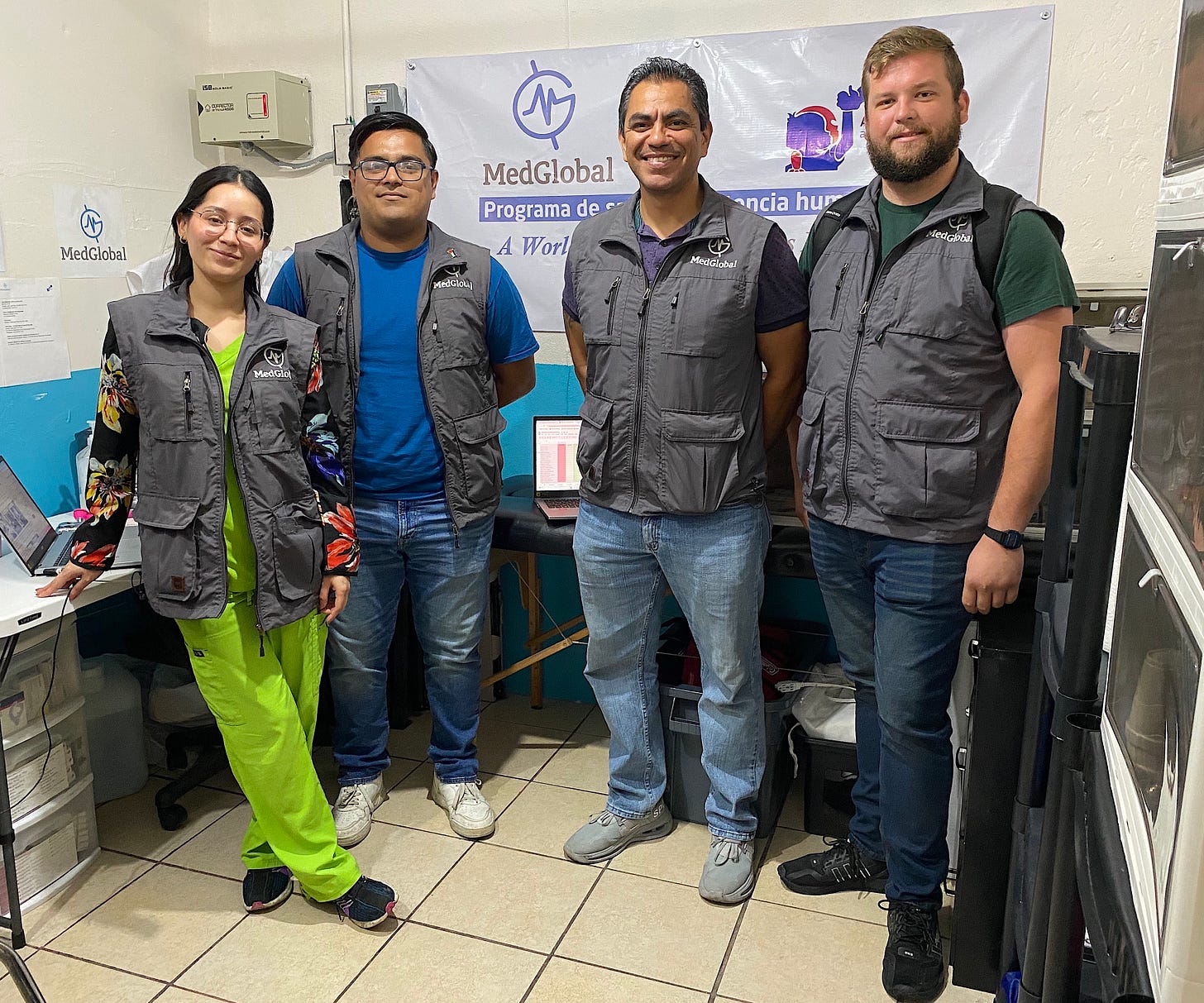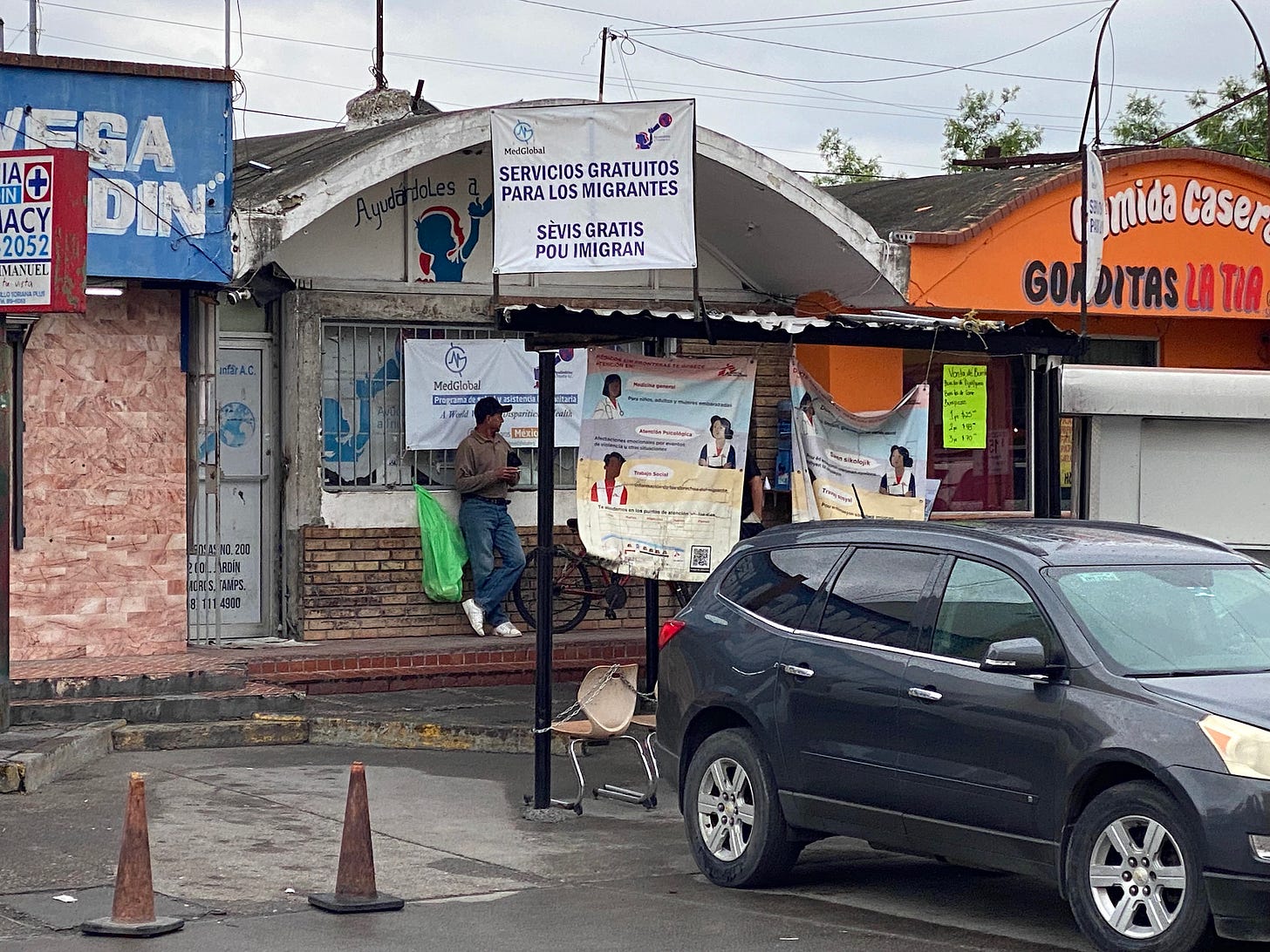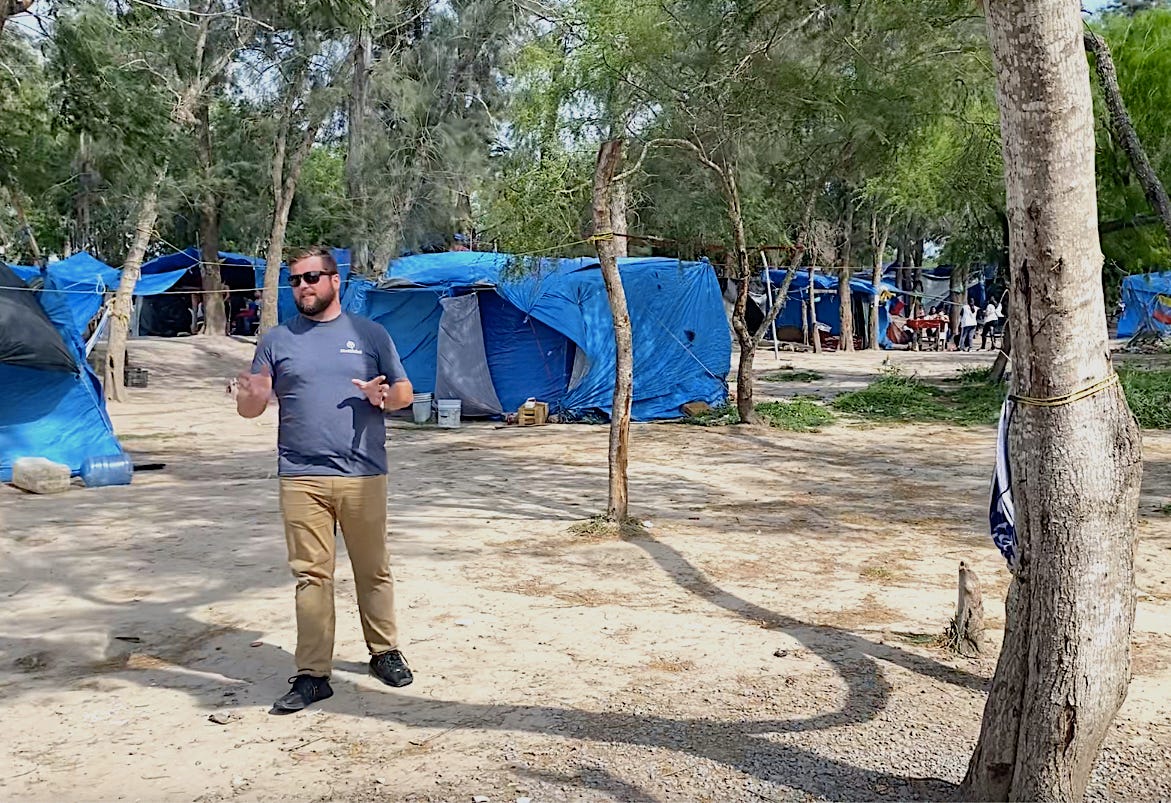A small border clinic with a big heart
The MedGlobal free clinic treats migrants who arrive in Matamoros, Mexico.

The size of the free medical clinic in Matamoros, Mexico, belies the scope of its mission and impact.
The MedGlobal clinic is tiny, just a waiting room and an examination room, next to the home of another humanitarian organization, Ayudándoles a Triunfar, that helps migrants in this border city.
The one-story structure is a few hundred yards from the Gateway Bridge into Brownsville, Texas. A small, outdoor waiting area offers a few chairs under a piece of metal roofing. Across the street is Garcia’s, a landmark restaurant and gift shop popular with visitors and locals.
After long and perilous journeys to Matamoros, migrants are finally close enough to the U.S. to see it across the Rio Grande. Finding a way across is a priority, so many new arrivals first seek legal and logistical help, said Benito Zambrano, MedGlobal project coordinator.
For that, they go next door to partner organization Ayudándoles a Triunfar, (“Helping them Succeed”), but many eventually seek medical help for themselves or their children for a variety of illnesses and injuries.
The clinic has a medical staff of two — Dr. Karla Denisse González Alvarez, 29, and nurse José Garcia Pérez, 25.
Since the clinic opened in January, they’ve seen and treated gastritis, diarrhea, allergies, urinary tract infections, high blood pressure, depression, fungus, epilepsy, hernias and one case of malaria.
They’ve also seen patients who have been kidnapped, raped and subjected to other forms of violence during their journey north, which for many migrants includes traversing the deadly, 60-mile Darién Gap between Colombia and Panama.
“It makes me feel good and happy to help them and consult with them on their health,” Dr. González said in Spanish. “They need a lot of help.”
The patients come from a variety of countries — primarily Haiti, Venezuela, Colombia, Honduras, El Salvador, Cuba and Mexico.
Dr. González smiled as she recalled interacting with a 9-year-old boy from Venezuela with autism who came into the clinic with his parents. They are now in the U.S. and he is receiving care there, she said.
Garcia, who has been a nurse for two years and like Dr. González grew up in Matamoros, said his most memorable case did not involve a migrant, but a local resident who had been stabbed repeatedly at her home. The woman recovered, he said.
Three days a week, the pair treats up to 20 patients per day at the clinic; the other two days they take it on the road to two sites a few miles away — the Casa del Migrante shelter on Wednesdays, and the Pumarejo family shelter on Thursdays.
The week before I visited the clinic on a Monday in mid-April, Dr. González and Garcia had seen 17 patients at Casa del Migrante and 31 more at Pumarejo, a former hospital. At Pumarejo, families live outdoors (but protected from the sun) side-by-side in pup tents resting on wooden pallets to keep flooding from heavy rains at bay.
Typical of how non-governmental organizations (NGOs) in Matamoros work hand-in-hand, Doctors Without Borders staffs the clinic space on Wednesdays and Thursdays while the MedGlobal team is at Casa del Migrante and at Pumarejo. Another NGO, the Sidewalk School, runs educational programs for the children who spend months waiting with their parents for permission to enter the U.S. and are at risk of falling behind academically.
MedGlobal’s Brendon Tucker, a Texas native, came to Matamoros in 2019 to protest the U.S. government’s “Remain in Mexico” policy that subjected asylum seekers to rape, extortion and kidnapping in border cities. Tucker met volunteers from several humanitarian organizations, and it became clear to the now 29-year-old that he had to stay.
“I’m motivated by anger,” said Tucker, whom everyone calls by his last name. “It’s infuriating to see what we’ve allowed to happen, what we’ve done. Once you see it, it’s hard to leave.”
Tucker worked with organizations on both sides of the border, including Global Response Medicine, before becoming MedGlobal’s senior program consultant, helping establish its operations in Matamoros and Reynosa, another border city 55 miles west.
“This is the intersection of the world’s crises,” he said. “Economic turmoil, ecological disasters, climate change, and a war on peace and human rights, all collide here at the border.”
Tucker is proud of the “small, efficient team” in Matamoros, and is excited by the prospect of expanding MedGlobal’s reach.
“Our goal is to get a second team of medical providers and expand at Pumarejo,” he said of the family shelter. Plans include hiring a social worker to help migrants address the trauma of their journey and other mental health issues.
Zambrano said many of the migrants have been traumatized, especially those who survived the Darién Gap, where the sight of dead bodies is common. He recalled one patient who arrived on his own in Matamoros after the rest of his family had died in the Gap.
“That trauma stays with them a long time,” said Zambrano, 49, a native of Matamoros who lived in the U.S. and Canada for 13 years before returning home in 2006.
Tucker said it’s important to have a minimum level of primary care in place because the flow of migrants into and out of the city can change swiftly.
Last year the nearby encampment along the Rio Grande had more than 3,000 migrants staying there for months at a time. From there, they could look across the river and see their destino, the United States — behind rows of concertina wire and Texas National Guard soldiers.
Now, only a few dozen migrants remain in the encampment. Many have crossed into the U.S. by gaining appointments with the controversial CBP One app, while others have been moved to shelters for health and safety reasons.
There, they wait.
Casa del Migrante has anywhere from 200 to 400 people at a given time; Pumarejo about 500 to 800, Tucker said.
The needs of migrants in Matamoros and other border cities are great, and MedGlobal is just one of many humanitarian NGOs trying to meet them.
Anyone who wants to help can donate money or order supplies via the clinic’s Amazon wish list, with items ranging from prenatal vitamins to stethoscopes to laptops to specialized electronic thermometers. The list includes the priority level of each item and the number needed.
“We do everything here,” said Zambrano.
And, said Tucker, “There’s always something that needs to be done.”
—
MedGlobal is a humanitarian charitable non-governmental organization founded in 2017 by doctors, nurses and medics experienced in humanitarian medicine and emergency services “to address the health needs of the most vulnerable across the world.” True to its name, it has a global presence, with operations in Mexico, Colombia, Yemen, Sudan, Ukraine, Ecuador, Lebanon, Gaza and other parts of the world.
The MedGlobal clinic in Matamoros is supported in part by Massachusetts General Hospital, churches and humanitarian organizations such as Team Brownsville just across the border in Texas. (On a personal, small-world note, the director of Mass General’s Global Disaster Response and Humanitarian Action team (GDRHA) is Syracuse native and Nurse Practitioner Lindsey Martin. I met and wrote about Lindsey 30 years ago when she was a teenager, and a remarkable human being even then.)






An excellent report, Jim. Thank you.
Thanks again Jim for another shot of sorely needed hope. MedGlobal's 'wish list' on Amazon is a fantastic way for chronic procrastinators like myself to make an immediate and positive impact. Thank you so much for these reports.